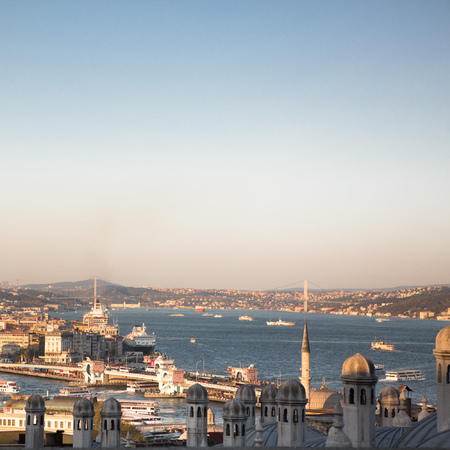
Wives and relatives of retired and active military officers charged in the so-called Sledgehammer trial march under a huge Turkish flag during a protest at Anitkabir, the mausoleum of Mustafa Kemal Ataturk, founder of secular Turkey, in Ankara, Feb. 19, 2011. (photo by REUTERS/Umit Bektas)
posted on Monday, Sep 24, 2012
When I heard the Sledgehammer sentences [which saw more than 300 Turkish military personnel imprisoned for their role in an attempted coup a decade ago], I first remembered the sentencing of the Greek junta. The leaders of the junta that came to power with a military coup and ruled Greece between 1967-1974 with a heavy hand were detained in January 1975 and brought to trial in July with charges of “high treason.”
About this Article
Summary:
Turkey’s Sledgehammer trials, like the Nuremberg trials in Germany and the sentencing of the Greek junta, were a watershed moment, writes Cengiz Candar, marking the end of military domination and the beginning of civilian rule.
Publisher: Radikal (Turkey)
Original Title:
Sledgehammer Trials: Turkey’s Nurnberg
Published on: Monday, Sep 24, 2012
Translated on: Monday, Sep 24, 2012
Translated by: Timur Goksel
Categories : Turkey
It took only until Aug. 25 — that is, less than a month — to sentence them to long prison terms in the trial held at Korydallos Prison. Three of the top four were sentenced to death by a firing squad and a fourth to life in jail.
The government of [former Greek prime minister Kostas] Karamanlis converted the death sentences to life imprisonment. Thirteen other generals were also sentenced to life, five generals to 20 years each and two were acquitted.
[Coup leader Colonel Georgios] Papadopoulos died in prison in 1999; [Brig. Gen. Dimitrios] Ioannides in 2010. [Brig. Stylianos] Pattakos and [Colonel Nikolaos] Makarezos spent their last years in hospital due to illness. There was an attempt to issue an amnesty to the junta in 1990 but, faced by harsh public reaction, the government of [former prime minister Konstantinos] Mitsotakis did not pursue it.
The case of the Greek junta, in an allusion to the Nuremberg trials of the German Nazi regime, became known as the “Nuremberg of Greece.” Is it possible to label the Sledgehammer case as the “Nuremberg of Turkey”?
It is important to recall the Greek junta affair because many Turkish democrats kept on comparing Turkey’s coup makers with the Greek junta. The Greek case was seen as a landmark that would forever rule out a military regime in Greece while in Turkey we were still perceiving “the regime’s military tutelage” as the unalterable fate of the country.
Looking from this point of view, yes, Sledgehammer may well be labeled the “Nuremberg of Turkey.” We now have a solid reason to think that the time of military coups and military interventions is over.
The Sledgehammer case will be a deterring precedent to any military personnel who, with the pretext and excuse of “saving the country,” might think of staging military coups. The historical significance of this trial is more related to its political aspects, as there are plenty of doubts about the legal aspects of how the trials were conducted and the sentences passed.
A total of 325 military personnel were given stiff prison sentences for “unaccomplished coup attempts” — 36 were acquitted. Three senior commanders were given life sentences which were later to reduced to 20 years on grounds of “unaccomplished attempt.” In addition, 78 people got 18 years, 214 got 16 years, one got 15 years, 18 got 13 years, four months and another got six years in prison. Among them are 24 generals on active duty.
This is really a shocking outcome. Apart from the political ramifications of the case, there has been much said about falsified evidence. Although we haven’t yet heard the detailed decisions, among the evidence used were incompatible dates, experts’ testimonies ignored by the court, witnesses not called and the names of those who were not even present in the 1st Army Plan seminar in Istanbul that constituted the basis of the trial.
The perception that the court did not consider the objections of the defense and counterclaims has become so widespread that this truly legitimate case against a coup attempt became a topic of debate even before the sentences were passed.
If no solid responses can be found to the claims of legal breaches and errors, decisions in the Sledgehammer case will be severely damaged from “legal and justice” perspectives. But we should not forget that Turkey had coups and their fomenters since the May 27, 1960, military coup.
Then there was the March 12 military intervention, the September 12 military coup and the Feb. 28, 1997 “postmodern coup” that fully confirmed the existence of military tutelage in our country.
As such, the Sledgehammer case has a political significance of putting an end to “military tutelage” and severely diminishing the coup mindset.
But there is no automatic assurance that we have transitioned democracy from military tutelage, given the claims of legal violations in the trial. We can speak of a long and tough road ahead with the appeals process that will follow.
Going to back the question: “Is Sledgehammer case Turkey’s Nuremberg?”
Yes, it is Turkey’s Nuremberg.
via The Sledgehammer Trials: Were They Turkey’s Nuremberg? – Al-Monitor: the Pulse of the Middle East.







